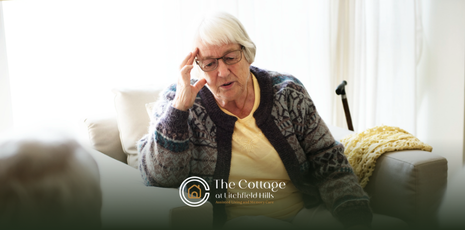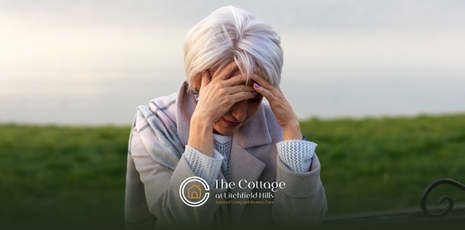Senior Living Benefits: Why Community Makes a Difference in Senior Care

As individuals age, maintaining a strong sense of belonging becomes just as important as receiving quality medical care. While clinical support is essential, it’s the feeling of being part of a community that truly enhances quality of life in senior years. Community in senior care isn't just about physical proximity—it's about connection, engagement, and purpose.
Whether it’s shared mealtimes, group activities, or everyday conversations with neighbors and staff, a caring community environment provides emotional security, encourages independence, and supports physical well-being. In this blog, we’ll explore the many reasons why senior living community makes a difference in senior care, and why it should be a top priority when choosing a senior living arrangement.
The Importance of Connection in Aging
Isolation is one of the greatest threats to the well-being of older adults. According to the National Institute on Aging, loneliness can significantly increase the risk of health problems such as cognitive decline, depression, high blood pressure, and heart disease. This is where the power of community comes into play.
Benefits of Connection:
- Improved Mental Health: Social interaction combats depression and anxiety.
- Stronger Immune Function: Engaged seniors tend to experience better overall health.
- Enhanced Cognitive Function: Conversations and shared activities keep the mind active.
- Increased Life Satisfaction: Feeling part of a community provides purpose and joy.
Having people to talk to, laugh with, and lean on can profoundly impact how seniors experience their golden years.
Emotional Support Through Community
Emotional well-being is critical in senior care, and community living offers a built-in support system. Residents often find comfort in knowing they are not alone in their experiences. They share stories, losses, and triumphs with others who understand.
How Community Provides Emotional Support:
- Peer Bonding: Seniors connect over shared life stages and interests.
- Staff Relationships: Trained caregivers often become trusted companions.
- Family-Like Environment: Residents build relationships that feel like family.
- Emotional Expression: Group therapy or informal chats allow healthy expression of feelings.
A caring community ensures that seniors feel seen, heard, and valued, which is something that can’t always be achieved in isolated or home-based care.
Community Encourages Active Living
Physical health and emotional wellness are intertwined. A strong community culture motivates residents to stay active, which in turn supports independence and vitality.
Community-Driven Wellness Opportunities:
- Group Fitness Classes: Yoga, tai chi, or walking clubs promote regular movement.
- Organized Games and Sports: Activities like chair volleyball or bocce ball bring fun and exercise.
- Gardening and Outdoor Activities: Spending time in nature enhances mood and mobility.
- Daily Activity Schedules: From dance to art, structured calendars keep residents engaged.
With others participating alongside them, seniors are more likely to stay committed to healthy routines that enhance longevity and independence.
Sense of Purpose and Belonging
Purpose doesn’t retire with age. Many seniors want to continue contributing, learning, and growing, and community gives them the platform to do just that.
Ways Community Inspires Purpose:
- Volunteer Opportunities: Helping in the garden, leading a group, or mentoring younger visitors.
- Creative Outlets: Art classes, music programs, or book clubs foster self-expression.
- Spiritual Engagement: Faith-based gatherings or quiet reflection groups support spiritual health.
- Resident Councils: Seniors can share feedback and help shape community life.
Having a voice and a role gives residents confidence and satisfaction. It also promotes a mindset of possibility rather than limitation.
Safe Socialization in a Supportive Environment
One of the challenges of aging is navigating social opportunities safely. In senior care communities, socialization is built into daily life, and it’s supervised by staff who understand seniors’ physical, cognitive, and emotional needs.
Socialization Benefits in a Controlled Setting:
- Inclusive Activities: Designed for all levels of mobility and cognition.
- Structured Schedules: Events are organized and accessible.
- On-Site Safety: Staff can assist in case of medical or emotional needs during gatherings.
- New Friendships: Residents easily meet others through shared meals or interests.
This balance of autonomy and supervision creates a nurturing environment that encourages social growth without compromising well-being.
Family Involvement and Support
A strong senior community doesn't replace family—it includes them. In fact, many communities encourage family involvement as a core part of resident care.
Ways Families Stay Connected:
- Open Visitation: Welcoming spaces for family visits and celebrations.
- Family Events: Holiday parties, themed dinners, or activity days.
- Care Conferences: Regular updates and input opportunities for loved ones.
- Technology Integration: Video calls and messaging systems for long-distance connection.
This partnership between families and the care team strengthens the overall support network and reinforces a sense of community for everyone involved.
Fewer Responsibilities, More Opportunities
One underrated benefit of community living is the freedom it offers seniors to focus on what truly matters. With chores like housekeeping, transportation, and meal preparation taken care of, residents have more time to enjoy relationships, hobbies, and rest.
Less Stress, More Joy:
- No Maintenance Hassles: Seniors don’t have to worry about broken appliances or yard work.
- Nutritious Dining: Enjoy chef-prepared meals without grocery shopping or cooking.
- Reliable Transportation: Scheduled rides to appointments, stores, or events.
- 24/7 Support: Peace of mind from knowing help is always nearby.
When basic needs are handled by the community, seniors can focus on relationships, recreation, and personal fulfillment.
A Positive Environment Boosts Health
A caring, upbeat environment has measurable effects on physical health. Seniors in positive community settings are more likely to eat well, stay active, and attend regular medical appointments, leading to better long-term health outcomes.
Health-Boosting Aspects of Community:
- Encouragement from Peers: Motivation from neighbors to walk, join activities, or eat well.
- Health Education Events: Seminars and wellness checks on-site.
- Prompt Medical Attention: Issues can be identified and addressed quickly.
- Mental Stimulation: Activities designed to challenge the brain and promote memory.
Community support is a powerful complement to traditional healthcare, it creates an ecosystem where seniors can thrive.
When Community Becomes a Second Family
For many residents, their senior living community evolves into something much more personal: a second family. Staff members often go above and beyond, and friendships blossom into lifelong bonds. Birthdays are celebrated, losses are mourned together, and everyday life is shared in meaningful ways.
This deep sense of belonging can transform the senior care experience from a clinical service to a life-enhancing journey.
Final Thoughts
Community is the heart of exceptional senior care. It provides more than physical support, it brings connection, purpose, and joy to every stage of aging. For seniors and their families alike, a nurturing, social environment can make all the difference in well-being and quality of life.
If you’re searching for a senior living option that prioritizes meaningful connections and compassionate care, The Cottage at Litchfield Hills offers a warm, vibrant community, such as assisted living and memory care, where seniors truly feel at home. Reach out today to learn more or schedule a visit.
Frequently Asked Questions
How does community benefit seniors in daily life?
A strong community helps seniors stay active, engaged, and emotionally fulfilled through social interaction, shared activities, and peer support.
Is community living safe for seniors with health conditions?
Yes, senior communities offer 24/7 support, staff supervision, and medical coordination to ensure safety while promoting independence.
Can family members be involved in the senior care community?
Absolutely. Many communities welcome regular visits, host family events, and provide updates to keep loved ones involved in care and daily life.
Sources:
- https://pmc.ncbi.nlm.nih.gov/articles/PMC10548654/
- https://hr.ucsf.edu/wellbeing/coping-and-resiliency-program/cope-program-wellness-resources/maintaining-wellness-older-adults-and-caregivers
- https://www.uclahealth.org/news/article/4-worthwhile-brain-games-older-adults-3
- https://newsroom.clevelandclinic.org/2022/12/09/why-socialization-is-important-for-older-adults






